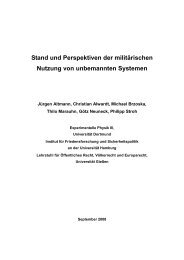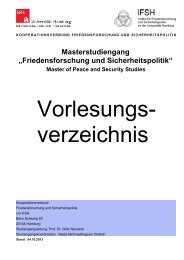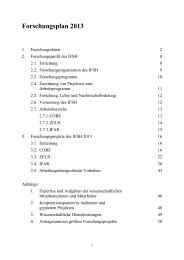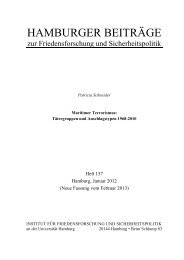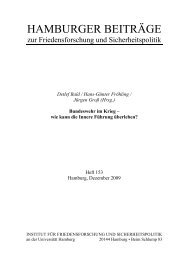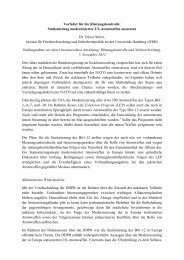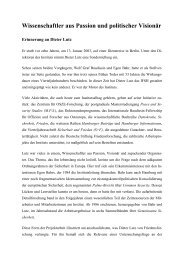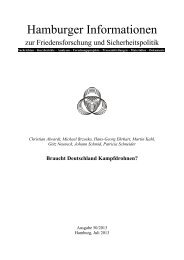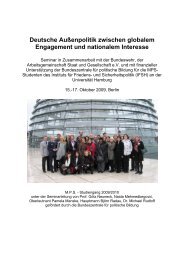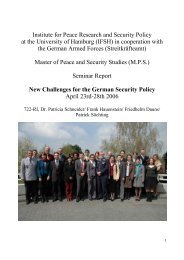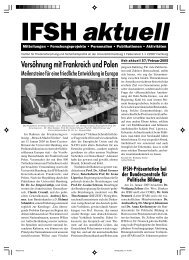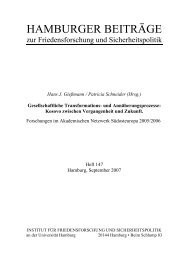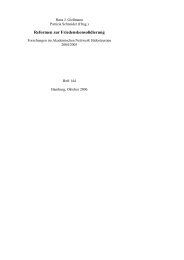Minority Rights Protection and Human Rights Policies in ... - IFSH
Minority Rights Protection and Human Rights Policies in ... - IFSH
Minority Rights Protection and Human Rights Policies in ... - IFSH
You also want an ePaper? Increase the reach of your titles
YUMPU automatically turns print PDFs into web optimized ePapers that Google loves.
towards the improvement of the <strong>in</strong>ter-ethnic relations as hav<strong>in</strong>g passed the first stage of a<br />
volatile coexistence <strong>and</strong> l<strong>in</strong>ger<strong>in</strong>g before the stage of collaboration.<br />
The discussion after Ilire´s presentation <strong>in</strong>cluded, among others, the question <strong>and</strong><br />
controversial underst<strong>and</strong><strong>in</strong>gs of the concept of reconciliation <strong>and</strong> the orig<strong>in</strong> of this concept.<br />
Hilary Bown, M.P.S. c<strong>and</strong>idate at the <strong>IFSH</strong> <strong>in</strong> Hamburg: Def<strong>in</strong><strong>in</strong>g m<strong>in</strong>orities<br />
Hilary started the group presentation of the German student group; she talked about def<strong>in</strong><strong>in</strong>g<br />
m<strong>in</strong>ority groups <strong>and</strong> therefore presented different m<strong>in</strong>orities, native people <strong>and</strong> ethnic groups<br />
<strong>in</strong> Europe to the audience. Hilary po<strong>in</strong>ted out that there is no clear def<strong>in</strong>ition <strong>in</strong> any legallyb<strong>in</strong>d<strong>in</strong>g<br />
<strong>in</strong>ternational treaty of what constitutes a m<strong>in</strong>ority. But despite controversial<br />
underst<strong>and</strong><strong>in</strong>gs of the term “m<strong>in</strong>ority” there are certa<strong>in</strong> agreed factors, which describes a<br />
ma<strong>in</strong>ly shared m<strong>in</strong>imum underst<strong>and</strong><strong>in</strong>g of a m<strong>in</strong>ority, <strong>in</strong>clud<strong>in</strong>g objective <strong>and</strong> subjective<br />
criteria (formulated partly <strong>in</strong> Article 27 of the “Covenant on Civil <strong>and</strong> Political <strong>Rights</strong>” of the<br />
United Nations (UN) <strong>in</strong> 1966):<br />
- a stable ethnic, religious or l<strong>in</strong>guistic differences which separated the m<strong>in</strong>orities<br />
significantly from the rest of the population<br />
- a non-dom<strong>in</strong>ant position at national <strong>and</strong> sub-national levels<br />
- a desire by the m<strong>in</strong>ority group to preserve cultural identity<br />
- citizenship of <strong>and</strong> loyalty to the state <strong>in</strong> which the m<strong>in</strong>ority is resident.<br />
Hilary referred to Tove Malloy, who po<strong>in</strong>ted out that often<br />
autochthonous groups became m<strong>in</strong>orities through historical shifts<br />
of boundary l<strong>in</strong>es, rather than through their own movements.<br />
There were groups whose territory was subsumed by another<br />
nation or empire or groups who migrated with<strong>in</strong> the boundaries of<br />
their empire <strong>and</strong> then found themselves outside their ethnic nation<br />
stated formed upon the collapse of the old empires for example.<br />
She po<strong>in</strong>ted out that <strong>in</strong> Europe there is ma<strong>in</strong>ly m<strong>in</strong>ority protection<br />
guaranteed to these “historical m<strong>in</strong>ority groups” (Swedes <strong>in</strong><br />
F<strong>in</strong>l<strong>and</strong> or Dans <strong>in</strong> Germany for example), nevertheless there are<br />
also “new m<strong>in</strong>orities” <strong>in</strong> nations, such as migrant workers or<br />
refugees for <strong>in</strong>stance. But still constitutionally guaranteed<br />
protection for these new m<strong>in</strong>orities is often neglected or denied. Therefore Francesco<br />
Capotorti, former UN Special Rapporteur of the Sub-Commission on the Prevention of<br />
Discrim<strong>in</strong>ation <strong>and</strong> <strong>Protection</strong> of M<strong>in</strong>orities, <strong>in</strong> his report to the UN <strong>in</strong> 1991 (“Study on the<br />
rights of persons belong<strong>in</strong>g to ethnic, religious <strong>and</strong> l<strong>in</strong>guistic m<strong>in</strong>orities”), urges a more<br />
flexible <strong>in</strong>terpretation of what constitutes a m<strong>in</strong>ority. His proposal for a broader def<strong>in</strong>ition of<br />
the term “m<strong>in</strong>ority” is nowadays <strong>in</strong> generally not as accepted as the mentioned m<strong>in</strong>imalist<br />
criteria, nevertheless a positive development of national m<strong>in</strong>ority protection regimes <strong>in</strong><br />
Europe dur<strong>in</strong>g the last decade is recognizable.<br />
Matthias Kock, M.P.S. c<strong>and</strong>idate at the <strong>IFSH</strong>: “The Right of Self-Determ<strong>in</strong>ation”<br />
Matthias gave a presentation about “The Right of Self-Determ<strong>in</strong>ation <strong>in</strong> International Law”.<br />
He first presented the development of a right of self-determ<strong>in</strong>ation, before the UN existed <strong>and</strong><br />
21



